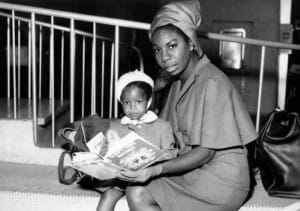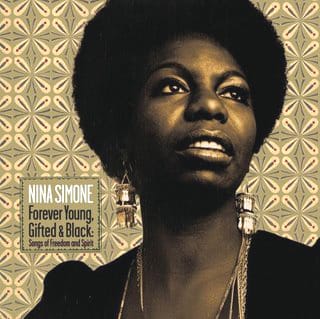Film review by The People’s Minister of Information JR
“I’ll tell you what freedom is to me – no fear. I mean really no fear. If I could have that half of my life – no fear,” said Nina Simone in a new Netflix-produced documentary about her life.

For many of us in the Black community today, the name Nina Simone evokes a reverence, although who she was and what she was able to accomplish has all but slipped from our collective memory through the cracks of time. Somehow we have failed to remember the depth, resonance and spirit of such songs as “Mississippi Goddam,” “Young, Gifted and Black” and “Strange Fruit” that defined an era in this country’s history and were the soundtrack to the Civil Rights Movement and the “Black is beautiful” cultural revolution of the ‘60s and ‘70s.
Most people recognize the raging and booming voice and writings of Malcolm X, shaking us out of the hypnotism of centuries of political, social and economic degradation, but right alongside Malcolm, we also had the soothing reassurance to keep fighting coming from the microphone and melodies of Nina Simone. Both were essential elements.
The new documentary, “What Happened, Miss Simone?” directed by Liz Garbus, goes head first into tackling this nation’s collective amnesia and dusting off the history of one of America’s most powerful and original female protest musicians.
“When I began to take lessons, I became terribly aware of how isolated I was from the other children – and how isolated I was from the white community and the Negro community. I felt it all the time.
“Even when the kids used to play with me, they always used to want me to play the piano for them to dance. I wasn’t asked too much to do anything else. That was very hard,” said Nina Simone, who dealt with depression, an abusive marriage and a grueling schedule among other things to become an international icon.

Born Eunice Waymon, Nina Simone changed her name at the beginning of her career when she started performing in bars and nightclubs “singing the devil’s music,” because she did not want her mother to become aware of how she was making a living. The name “Nina” means little in Spanish, and that was what one of her boyfriends nicknamed her; and the name “Simone” came from the name of a famous French actress at the time.
Before she passed away in 2003, Simone was nominated for 15 Grammys and given the Grammy Hall of Fame Award in 2000.
“When I first got into show business, I wasn’t even a blues singer. I wasn’t a jazz singer. I was a classical pianist. I studied to become the first Black classical pianist in America and that was all that was on my mind. That’s what I was prepared to be.”
“What Happened, Miss Simone?” is a beautiful and tragic look at the life of one of the women who made us proud to be Black. She helped us to transform our minds from the psychology of scared Colored Negroes into being proud Black Africans in America. The film documents some of her thoughts and includes a lot of archival interview footage and footage of her performing.

It talks about her traveling to Liberia and not wanting to come back. It shows footage of her playing piano at Carnegie Hall and for the 1959 television show “Playboy Penthouse,” which was hosted by Hugh Hefner.
It talks about how she was one of the first Black artists ever to cuss on a record. It shows footage of her playing the tambourine on a stool at the Newport Jazz Festival in 1960. It also documents some of the mental pressures that were chipping away at her happiness. People interviewed for the documentary include Simone’s daughter, Lisa Simone Kelly, her ex-husband, Andy Stroud, two of the Shabazz sisters and many more.
“My mother was one of the greatest entertainers of all time hands down, but she paid a huge price. People seem to think that when she went out on stage, that was when she became Nina Simone. My mother was Nina Simone 24/7, and that’s where it became a problem,” said Lisa Simone Kelly, the daughter of the legendary singer Nina Simone at the beginning of the cinematic masterpiece “What Happened, Miss Simone?”

“Once she was performing, she was brilliant. She was loved. She was also a revolutionary. She found a purpose for the stage, a place from which she could use her voice to speak out for her people.”
I was able to connect deeply with the spirit of Nina Simone through this time capsule that we call “What Happened, Miss Simone?” The documentary has already caused me to dig up some of her music and want to know more about this artistic and mysterious shero of the revolution.
I liked the way that Nina Simone spoke for herself in the film, in much the same way as Tupac in one of the definitive films about his life, “Tupac: Resurrection.” I also liked that a sizable number of Black women were interviewed, because many times in documentaries released on mainstream platforms about important Black people, the voices of white people who were not directly connected to the subject overwhelm Black voices.
This film is different. It is definitely one that my children will have to watch when they are learning about the history of our people in this country as well as the history of the music business.

The great Nina Simone went through a lot in life, so it makes me feel good that she is finally getting the veneration that she deserves – unfortunately, not until after her death. But this film will allow generations coming of age after her passing to experience her light and her fight against her own internal demons and the U.S. system of government, which is guilty of enslaving and stealing the resources of Black people around the world.
“You’re always in congress with yourself. The challenge is how do we fit in the world that we are around? Are we allowed to be exactly who we are? Was Nina allowed to be exactly who she was – as fragile as she was strong, as vulnerable as she was dynamic?
“She was African royalty. How does royalty stomp around in the mud and still walk with grace? Most people are afraid to be as honest as she lived,” opined Ambassador Attallah Shabazz, one of the goddaughters of Nina Simone and one of the daughters of Malcolm X.
“What Happened, Miss Simone?” will be released theatrically in New York on June 24 and in Los Angeles on June 26. And it will premiere on Netflix also on June 26.
The People’s Minister of Information JR Valrey is associate editor of the Bay View, author of “Block Reportin’” and “Unfinished Business: Block Reportin’ 2” and filmmaker of “Operation Small Axe” and “Block Reportin’ 101,” available, along with many more interviews, at www.blockreportradio.com. He can be reached at blockreportradio@gmail.com.
https://youtu.be/moOQXZxriKY
https://youtu.be/FCrwInKcdY0
https://youtu.be/fVQjGGJVSXc
https://youtu.be/h3OIfuVpocU





